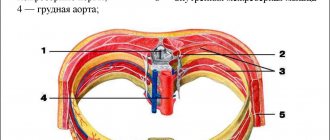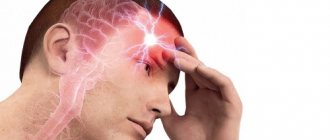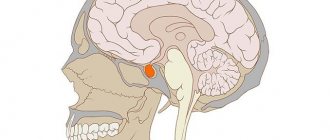Menstrual migraine
is a subtype of migraine without aura. The head may begin to hurt during menstruation (on the first day), before or after menstruation (if there is no delay in menstruation, because, in this case, we can also talk about migraines during pregnancy).
In pathophysiology, the main reason why a headache is
during (on the first or any subsequent day) or after menstruation, a decrease in estrogen levels towards the end or after the luteal phase of the cycle and an increase in prostaglandins during the first 48 hours after the onset of menstruation is considered (again, a delay is excluded due to the fact that during pregnancy these there are no phases, although the headache occurs for a similar reason - due to hormone imbalance).
Acute treatment and prevention of menstrual migraine is no different from conventional therapy. Preventative treatment uses triptans, hormonal prophylaxis aimed at stabilizing high or low estrogen levels.
Menstrual migraine – main characteristic
Migraine, the occurrence of which is associated with the period of menstruation (headache during menstruation - on the first or any subsequent day, immediately before and immediately after the end of menstruation) is called menstrual. With minimal exceptions, we are talking about migraine without aura.
The pathophysiology of the disease is very complex, and there are a number of hypotheses that try to explain why headaches occur during, before or after menstruation.
. These include low or high progesterone levels, low or high estrogen levels, sudden drops in estrogen levels, high estrogen to progesterone ratios, low or high prolactin levels, increased prostaglandin release, magnesium or vitamin deficiencies, changes in immunological parameters, and much more.
If there is a delay and it can be said that the head hurts during pregnancy, the reason, most often, lies in the sudden imbalance of hormones that prepare the body for its natural role.
The first accurate description of menstrual migraine was submitted in 1660 by J. A. van der Linden. In his work, he describes attacks of the Marquise of Brandenburg, accompanied by nausea and vomiting.
More than 50% of women point to the timing of their period as a migraine trigger. The International Classification of Headaches defines 2 subtypes of the disease.
1. True menstrual migraine. It is defined as a condition in which the headache occurs exclusively on the 1st day of menstruation plus 2 days before and 2 days after this date (5 days in total), for at least 2-3 cycles in a row.
2. False menstrual migraine is also associated with menstruation, but is characterized by attacks on the 1st day of menstruation (± 2 days), but also at any other time outside this period.
3. Premenstrual migraine. An attack can occur between the 7th and 2nd day before menstruation, never after it. A woman, as a rule, exhibits all the symptoms of PMS: depression, anxiety, fatigue, drowsiness, back pain, breast tenderness, swelling of the limbs, nausea, general discomfort.
Causes of headaches during menstruation
Headaches during menstruation occur quite often. It can be caused by poor nutrition, structural features of a woman’s body, even changes in weather. But sometimes the pain syndrome becomes regular: the pain appears every month and causes significant discomfort to the person. Below we will consider the main causes of pain.
Changes in hormonal levels
Normally, during menstruation, a woman’s estrogen levels drop and the amount of progesterone increases. Why is this happening? Progesterone is a pregnancy hormone that prepares a woman’s body for the possible development of a fetus. Given that pregnancy does not occur, the increase is followed by a decrease in progesterone levels. These jumps provoke a headache in a woman. Patients also note that their forehead and eyes hurt.
Migraine
Women often experience migraines during menstruation. It begins in a classic way - with nausea, spots flashing before the eyes, and a headache. The pain affects one side of the head and can shoot into the ear or under the jaw. There is also a difference from a regular migraine - during a menstrual attack there is severe nausea, sometimes turning into vomiting, severe throbbing headaches that are not amenable to painkillers. The patient becomes irritable, constantly wants to lie down, and may react aggressively to others. A migraine attack during menstruation lasts from 12 hours to three days.
Pathology of the vascular system
Another factor that provokes headaches during menstruation is disruption of the cardiovascular system. These include:
- Vegetative-vascular dystonia.
- Vascular spasms.
- Atherosclerosis.
- Arterial hypotension.
How are periods and headaches related? The condition of the blood vessels is affected by changes in hormones, as well as by the fact that during menstruation the load on the blood vessels increases. Arteries, veins, capillaries do not have time to stretch, pumping large volumes of blood, so a spasm occurs and, as a result, pain. The access of oxygen to the brain is reduced, and the pain is spasmodic and squeezing in nature.
Violation of water-salt balance
During menstruation, women experience swelling and even slight weight gain (up to 1 kg) due to deterioration of fluid outflow. This occurs because the body must reject tissue from the unfertilized uterus. Swelling develops in the limbs, face, and can also occur in the brain, resulting in a pressing or bursting headache. Painful sensations can affect the back of the head, the crown of the head, spreading diffusely throughout the head.
Effects of medications
If you have a question: “Why does my head hurt during menstruation?”, think about whether taking certain medications causes discomfort? Women taking oral contraceptives sometimes experience headaches during their periods. Patients over 35 years of age, as well as women suffering from venous thrombosis, most often complain about the occurrence. The headache occurs because birth control pills change hormonal levels, preventing the normal maturation of the egg. At the same time, the woman’s production of her hormones changes and the functioning of the vascular system is disrupted.
Anemia
Heavy (if a pad with the maximum number of “drops” has to be changed more often than once every three hours) or prolonged periods can provoke anemia. A deficiency of hemoglobin in the blood causes a decrease in the amount of oxygen supplied to brain cells. At the same time, the patient’s skin turns pale, a feeling of extreme fatigue, drowsiness, dull headaches, dizziness, and darkening appear.
Can I get a headache during menstruation due to anemia? Rather, the cause of the headache should be called a decrease in blood pressure, which occurs with anemia. Although a lack of oxygen can also provoke pain in different parts of the head.
Intoxication
If you experience a headache during menstruation, the discomfort may be due to intestinal dysfunction. During menstruation, the erythrocyte sedimentation rate increases, which indicates the development of an inflammatory process. Dead tissue, not completely eliminated from the body, produces toxins, which, in turn, are absorbed into the vascular bed.
A woman experiences symptoms of poisoning: loose intestines, loose stools, cramps in the lower abdomen, headache (usually in the forehead, squeezing like a hoop, pulsating).
Treatment
It is known that menstrual migraine attacks tend to be more severe, last longer, often for several days, and are resistant to conventional treatment. This fact is probably influenced by the hormonal situation and the mental instability associated with it. The management of the disease must take into account the fact that the frequency of attacks can be predicted, which allows the introduction of preventive treatment.
However, if you have a delay, and it may be a headache during pregnancy, you should exercise extreme caution when choosing a treatment method, because most medications are contraindicated during this period!
Explanation from a scientific point of view
In the follicular phase of MC, GnRH is synthesized, and this occurs in the hypothalamus, the level of follitropin and lutropin increases after GnRH begins stimulating the adenohypophysis.
The level of estradiol gradually begins to increase, which leads to the release of a large amount of lutropin. Luteinizing hormone turns the follicle into the corpus luteum, thereby starting the process of progesterone production and the release of LH is influenced by gonadoliberin.
There is an increased secretion of follicle-stimulating and luteinizing hormones, but conception does not occur. Therefore, both formations, acting on cells, lead to the release of cyclic adenosine monophosphate.
It not only distributes hormonal signals within cells, but also participates in hematopoiesis, cell motility, changes cell functions, speeds up or slows down reactions. The same compound is inhibited by caffeine derivatives. And caffeine is included in some headache medications.
When to see a doctor
Severe pain that lasts more than two days is considered a clear sign of a serious pathology. Moreover, these sensations are so unbearable that the woman needs to free herself from all her affairs and stay at home. When headaches are accompanied by nausea, diarrhea, vomiting, dizziness, stabbing pain in the abdomen, these may be signs of severe blood loss and anemia.
If the painkillers taken do not help and you notice a large discharge with cramping pain - these signs may indicate an ectopic pregnancy, an urgent examination by a gynecologist is necessary. Also, if severe pain appears suddenly during menstruation due to irregular cycles or decreased weight, this indicates signs of a tumor.
To treat intense headaches during menstruation, the doctor prescribes low-dose hormonal medications, medications containing phytoestrogens, homeopathic remedies, vitamin complexes and physiotherapeutic methods.
General Tips
Knowing the causes of severe headaches during menstruation, you can prevent its occurrence. To do this, you just need to follow some rules of prevention:
- Proper healthy sleep (at least 8 hours);
- Ventilate the room you are in. It is especially useful to ventilate the bedroom before going to bed;
- Stick to proper nutrition;
- Nobody has yet canceled sports, or even just morning exercises;
- Elimination of bad habits - alcohol, smoking, drugs.
All these preventive measures will help not only prevent headaches, but also keep your body in good shape and maintain overall health. Be healthy!
Types of dizziness
Headaches can come in different ways. Depending on the nature and location of the pain, the following types of pain during PMS are distinguished.
Feeling dizzy before your period? It may be a disorder of the nervous or vascular system, which is classified as:
- central, associated with a lack of oxygen for brain function. Directly depends on the dilation and constriction of blood vessels, which is not uncommon for PMS syndrome;
- peripheral, which usually has no connection with the cycle, and its cause is the effect of other health problems on the functioning of the inner ear or vestibular nerve.
Dizziness and nausea both before and after menstruation can be caused by:
- Systemic in nature, which is the most dangerous, because such symptoms occur from month to month and may even have an aura. Reasons: disturbances in the functioning of the vestibular apparatus or hormonal imbalance, which means you urgently need to consult a doctor.
- Unsystematic in nature, when you feel dizzy during menstruation due to intense physical activity or a strict diet, which lead to a sharp release of hormones and glucose starvation.
Vertigo can be systemic or non-systemic. The first type of dizziness appears periodically, for example, before the start of a cycle, after menstruation or during ovulation, but then it stops on its own until the next time. Why do you feel dizzy with systemic vertigo? The reasons are related to hormonal imbalance, imbalance of progesterone and estrogen, atmospheric pressure changes.
When the patient has menstruation and painful sensations have formed, it is necessary to correctly classify dizziness, since this will make it possible to approximately determine the provoking factors and choose the appropriate therapy.
Application of essential oils
You can quickly soothe a migraine headache with essential oils (lavender, rose, basil, menthol, marjoram).
It is enough to place a few drops of one of the oils in an aroma lamp (or on a napkin) and periodically inhale the aroma.
A head massage using essential oils (oregano, rose, chamomile, lavender) is good for relieving migraines.
An effective remedy is a cool compress with essential oil (basil, mint, lavender, lemon). You can start using one type of oil at a time and then combine them.
If it is not possible to perform breathing procedures, do a light massage of the temporal area. Pre-moisten your fingertips with lavender oil. The effect of the massage will be more powerful if you try to take even and deep breaths.
Other oils can be used as a medicinal extract: eucalyptus, sandalwood, mint.








